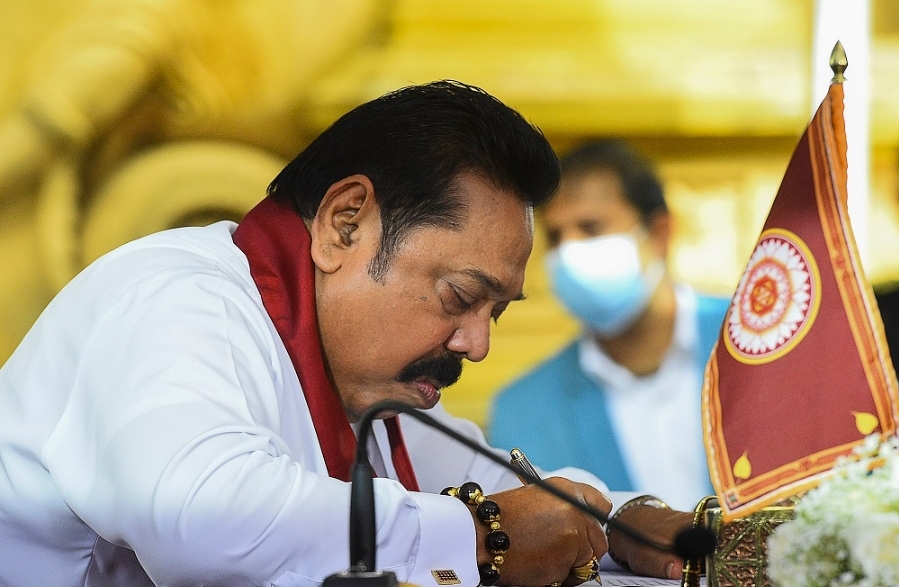
By Mahinda Rajapaksa
Former President, SLPP Leader
Around 40 professional associations and trade unions representing vital sectors of the economy and the public services have been agitating for a reduction in income taxes for many months. In the meantime,the high tax burden has precipitated an exodus of educated and highly trained professionals from the country giving rise to a new crisis.
Following increases in the VAT through the budget for 2024, tax policy is set to become a major political issue in 2024.
The call to reduce taxes is based on solid economic principles. When taxes are low, both individuals and corporations have more money to spend and invest and this acts as a driver of the economy. Low taxes was a cornerstone of my government’s policy and it made a major contribution to the unbroken nine year economic boom that this country experienced between 2006 and 2014. So as not to burden the people with taxes, my government of 2006-2014 restricted the overall year on year increase in government tax revenue to around Rs. 100 billion a year. Through careful economic management, my government reduced the debt to GDP ratio from 90% at the end of 2005 to 69% at the end of 2014 thus ensuring the feasibility of the low tax regime.
However, over the past several years there have been well-funded propaganda campaigns promoting a headlong and mindless opposition to everything even remotely associated with the name ‘Rajapaksa’ including the low tax policy. In order to blacken the very concept of low taxes, some even claimed that the Rajapaksa-led governments reduced taxes to help cronies. That is an outright lie.
Tax exemptions can be granted only under laws like the Board of Investment Act and the Strategic Development Projects Act in order to attract investors for specified projects.
After 2015, the low tax regime was rejected in favor of a high tax regime. Unsurprisingly, Sri Lanka’s growth rate declined precipitously after 2015 ending up at 0.2 below zero by 2019. Due to bad economic management, the period from 2015 to 2019 saw an increase taxes while at the same time experiencing a precipitous increase in foreign debt. When I was voted out in January 2015, the outstanding International Sovereign Bond debt was only USD 5,000 million. The Gotabaya Rajapaksa government of 2020-2022 paid off USD 2,500 in outstanding ISBs which means that only USD 2,500 million in ISBs now remains from my era.
Over USD 10,000 million in new International Sovereign Bonds were taken between 2015 and 2019.
Hence we still have an outstanding ISB stock of USD 12,500 million. It was this USD 10,000 million in new ISBs taken between 2015 and 2019 that broke the back of our economy. When the Covid-19 pandemic struck Sri Lanka a few months after I became Prime Minister at the end of 2019, we wrote to the IMF in March 2020 asking for emergency assistance. The IMF wrote back saying that our deb tlevels disqualifies us from their emergency relief package.
They then proposed a raft of conditions that would qualify us for IMF assistance but those conditions would have made it impossible for us to face the Covid-19 threat in the manner that we did in 2020 and 2021. The present government is now implementing stringent conditions as part of an IMF programme.
Thus one thing led to another, finally resulting in a situation where we now see top professionals holding multiple university degrees and professional qualifications agitating on the streets, demanding a reduction in taxes.
The SLPP which I lead is a part of the government. However the present Head of the Government and Head of State is the leader of a different political party with different policies.
In a situation where this country was faced with complete anarchy, Parliament elected a President to serve the remainder of former President Gotabaya Rajapaksa’s term. The new President successfully restored law and order to the country. He is now directing government policy as the Executive President. At this moment, the primary duty of the SLPP is to ensure a stable government until the next national elections.
In future, every member of the public should pay special attention to the tax policy and the past economic practices of the political party they vote for. As elections draw closer, once again we seenattempts to hustle people blindly and unthinkingly in various directions through ramped up propaganda and social media hysteria. Whatever decision the people make at the next elections should be based on rational thinking, proper facts and correct data. We are still living through the consequences of January 2015 and this country cannot afford another mistake like that again.
